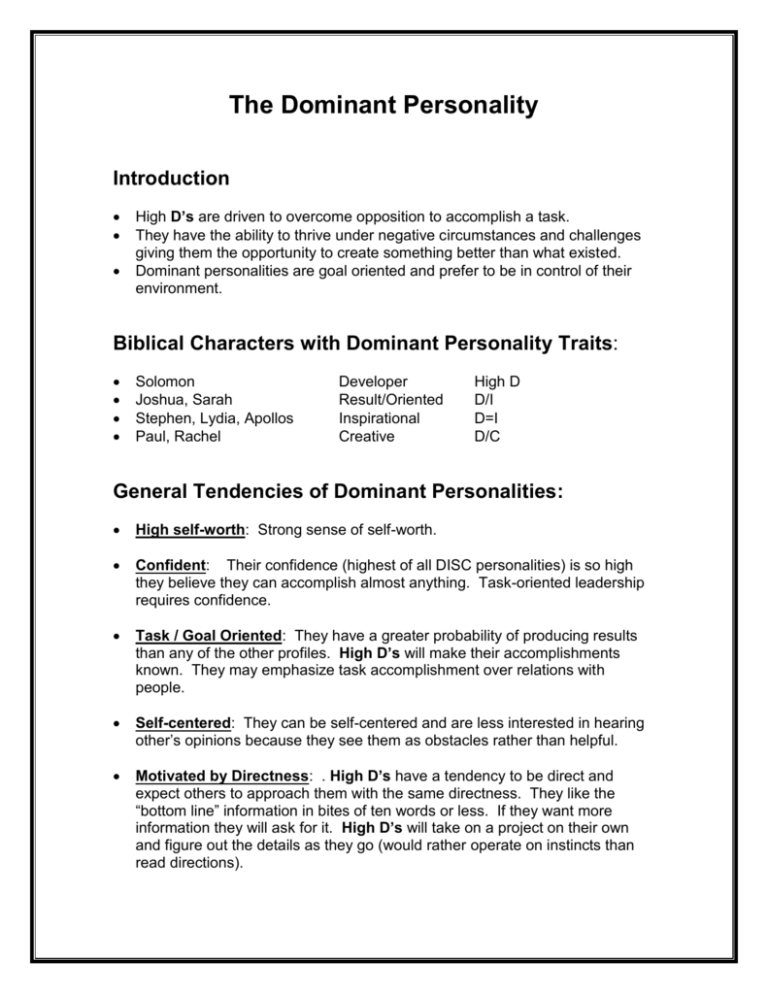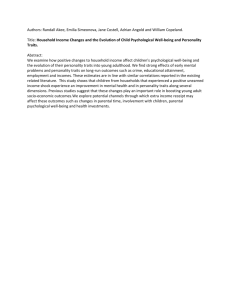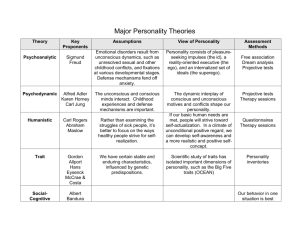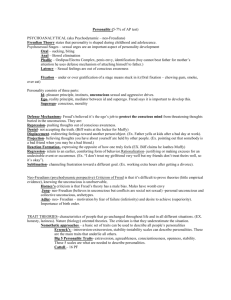The Dominant Personality
advertisement

The Dominant Personality Introduction High D’s are driven to overcome opposition to accomplish a task. They have the ability to thrive under negative circumstances and challenges giving them the opportunity to create something better than what existed. Dominant personalities are goal oriented and prefer to be in control of their environment. Biblical Characters with Dominant Personality Traits: Solomon Joshua, Sarah Stephen, Lydia, Apollos Paul, Rachel Developer Result/Oriented Inspirational Creative High D D/I D=I D/C General Tendencies of Dominant Personalities: High self-worth: Strong sense of self-worth. Confident: Their confidence (highest of all DISC personalities) is so high they believe they can accomplish almost anything. Task-oriented leadership requires confidence. Task / Goal Oriented: They have a greater probability of producing results than any of the other profiles. High D’s will make their accomplishments known. They may emphasize task accomplishment over relations with people. Self-centered: They can be self-centered and are less interested in hearing other’s opinions because they see them as obstacles rather than helpful. Motivated by Directness: . High D’s have a tendency to be direct and expect others to approach them with the same directness. They like the “bottom line” information in bites of ten words or less. If they want more information they will ask for it. High D’s will take on a project on their own and figure out the details as they go (would rather operate on instincts than read directions). Aggressive: They will enter into conflict with others if they perceive the person as a threat to their goals. High I’s will see High D’s as cold and insensitive. Joshua was the perfect leader to lead the Israelites in the conquest of Canan. Blind Spots of the High D: Fear of Loosing Control: They quickly seize opportunities that allow them to control their own destiny. They see confrontation as the best method of dealing with challenges to their goals. They are quick to take the offensive against a challenger. Caution: do not take on a High D unless you are ready for battle and know you can win. Insensitive to Others: Because they are extremely self-sufficient and think they are right most of the time they have a tendency to not be concerned with the views and feelings of others. Unfortunately, their self-confidence and task orientation can desensitize them to the feelings and thoughts of others. Sensitive people are often left hurt and angry when relating with High D’s. They need to learn to listen to others and be sensitive to their needs. Impatient: High D’s can be impatient and often require special events and special people to help them learn patience. Solomon had his brothers and one of his generals killed because they threatened his control. 2 Primary High D Personality (The Developer Pattern) I. II. Tendencies of High D Personalities: Primary drive Very independent in seeking solutions to problems Personal giftedness Innovative problem solver Group giftedness Energy base to see that things get accomplished Potential spiritual gifts Wisdom, Exhortation, Administration Internal fear Loss of control Strength out of control Focusing on goals without concern for people’s feelings Under stress becomes Intense, active, and initiates action Blind spots Seeing the need to be accountable to others Needs to work on Empathy, understanding, and cooperation with others Best team members I/S/C, I/S, S/I Biblical Characters Who Represent High D Personality Traits: III. Solomon Rahab Further Bible Study Strengths Weaknesses Eccl. 2; 1Kings 6; 9:1-9 1 Kings 2:34-46; 11:1-13 3 The Primary D Personality Traits (The Developer/Director Personality) The Developer or Director personality projects the most pure tendencies of the High D personality style. Positive Traits: The D personality is more of an individualist and tries to meet his own personal needs. They place an emphasis on seeking answers to difficult challenges without help from others. Solomon is a good example of the High D. Personal Giftedness: The major focus of the D personality is to identify the problem and seek innovative methods of solving it. They have a tendency to disregard the norms of acceptable behavior and use whatever means to meet the challenge at hand. Strength Out of Control: High D’s will use their ability to manipulate others as a means to promote their own causes. They see themselves as being shrewd rather than manipulative like others see them. Approach To Teamwork: Initiates action Likes to be in charge Motivated to reach goal(s). Leadership or Management Style: Adopts an autocratic style Defines responsibilities for others Implements action plans with accountability 4 Sensitivity to Feelings of Others: Tends to be insensitive to the feelings of others Sees emotional expressions as obstacles and unnecessary Sees life as a battle Releasing Stress: Becomes intense when goals are blocked Prone to outburst of anger Releases stress through physical exercise Recovery from Emotional Stress: Most often will engage in a physical activity. Making Spiritual Commitments or a Commitment to Christ: Usually requires a traumatic event which challenges their control over their life and future. Strengths of the High D Personality: Initiating Decisive Goal-oriented Authoritative Competitive Forceful Complementary Strengths Needed: Taking care of details (C personalities) Showing patience (S personalities) Showing concern for people (I personalities) Diplomatic (S personalities) Team player (S personalities) Verbalize feelings of/to others (I personalities) Note: When a High D’s tendencies are out of control, they can offend others by being too aggressive and by being insensitive to the feelings of others. 5 The High D/I Personality (Result-Oriented Personality) I. II. Tendencies of D/I Personalities: Primary drive Strength of character, gets results Personal giftedness Flexibility, self-motivated aggressively takes charge Group giftedness Acts as catalyst to carry difficult assignments Potential spiritual gifts Leadership, Exhortation, Faith Internal fear Lack of urgency in moving ahead in accomplishing a goal Strength out of control Pushes for action when patience is a better option Under stress becomes Emotionally reactive and demands action Blind spots Seeing where their actions contribute to negative consequences Needs to work on Not manipulating people and circumstances; not striking out toward others Best team members S/C, S/C/D, S/I, C/S Biblical Characters Who Represent D/I Personality Traits: III. Sarah Joshua Further Bible study: Strengths Weaknesses Josh. 3:1-17; 24; 1-33 Gen. 16:1-6; 21:1-10 6 The High D/I Personality Traits (Result-Oriented Personality) Positive Traits: The D/I personality style is driven mainly by dominance and secondarily by influencing traits. This representative profile displays a gift for taking command of situations. These individuals are quick and decisive and give direct and forceful instructions. Few people will challenge them because they are so forceful. Joshua (Jos. 1:16) was an organizer. Personal Giftedness: This personality type commands respect, and others rely upon their strength and persistent character. They are determined and move forward regardless of the barriers. They see obstacles as challenges waiting to be conquered. See: Joshua Strength Out of Control: Under stress, D/I personalities have a tendency to be impatient and to use confrontation and intimidation as a means of gaining control. Refer to the story of Moses and Pharaoh 7 The D = I Personality (Inspirational Personality) I. II. Tendencies of the D=I Personalities: Primary drive Strong drive to control by charm and persuasion Personal giftedness Talented at achieving goals through verbal skills Group giftedness Articulating a point of view Potential spiritual gifts Prophecy, Evangelism, Teaching Internal fear Not having authority to control events, complex relationships Strength out of control Overwhelming others with words and arguments Under stress becomes Intimidating and can tend to manipulate others Blind spots Understanding that their aggressive style often causes covert responses Needs to work on Not having to win every argument, slowing down Best team members S/C, S/I, I/S Biblical Characters Who Represent D=I Personality Traits: III. Stephen, Apollos Lydia Laban Further Bible Study Strengths Weaknesses Acts 7:1-50; 16:14-15 Acts 7:51-60 8 The D = I Personality Traits (Inspirational Personality) Positive Traits: D=I or Inspirational personalities are quick to identify the best way to motivate those around them. They are often perceived as Motivators. They have a keen sense of knowing what other people need or want. They do not use tentative words like suggest or think. More often they forcefully claim, maintain, and allege. D=I personalities are willing to risk rejection. Stephen’s sermon was so forceful the leaders wanted to kill him. Personal Giftedness: D=I personalities have equal measures of dominance and influencing traits. Thus, they can be both confrontational and entertaining. They are skilled with words and have no peers in their ability to persuade others of their point of view. Refer to Apollos Strength Out of Control: D=I personalities sometimes manipulate the rules to work for their personal advantage. They often forgive themselves for their shortcomings and when failure occurs they shift personal guilt to someone else. Laban used this tactic on Jacob. 9 The High D/C Personality (The Creative Personality) I. II. Tendencies of the D/C Personalities: Primary drive/goal Being the front-runner in developing new concepts Personal giftedness Being the instrument to bring about change. Group giftedness Critically looking at old systems and making them better. Potential spiritual gifts Discernment, Wisdom, Prophecy Fears Not being influential, others failing to meet their standards Under stress becomes Sulky; condescending and critical toward others, bored with routine work. Strength out of control Fixing things that are not broken Blind spots Understand that grace and forgiveness are critical elements in relationships. Needs to work on Communicating warmth, patience, softening judgmental, critical spirit Best team members I/D, I/S, I/S/C, S/C Biblical Characters Who Represent D/C Personality Traits : III. Paul Rachel Further Bible Study: Strengths Weaknesses Rom. 3:20-=30; Gal. 3:10-29 Gal. 2:11-14; Acts 15:36-40 10 The High D/C Personality Traits (The Creative Pattern) Positive Traits: The D/C personality is driven mainly by dominance and secondarily by their conscientious traits. They have the gift of analyzing a system and determining its shortcomings. They not only have the ability to see the big picture, but also the details of the picture. They can quickly discern the solution to a problem and present it in such a way that it makes sense. D/C (Creative) personalities influence others by setting the pace for communicating new ideas. Personal Giftedness: D/C personalities impact relationships by their ability to initiate activities that bring about change. Paul spent his life and ministry working toward bringing about change in the thinking of both the Jews and Gentiles. Internal Fears: D/C (Creative) people fear not having sufficient authority to change a course of events or the lives of others. Paul’s life is a testimony to submissiveness to God and allowing the Holy Spirit to turn weaknesses into strengths. 11 Needs of the Dominance Personality Overview of High D’s Personality: The High D wants to be in total control of their environment. They will naturally challenge and rebel against anyone or structure imposed on them. High D’s put a great deal of importance on winning, only to discover that they must pay a high price in stress and struggle to meet that goal. They believe that they must always be pushing forward and to relax would to risk becoming vulnerable. Family members and close friends often become objects whose major function is to help them achieve their goals. And if they do not perform effectively they can expect an unpleasant reaction. This pressure can result in broken relationships. For the High D, the controlling drive to succeed is a never-ending process. Creative personalities often report that a war is continually being waged in their minds. One message says, “I must do this,” and the other message counters with, “I should not do it.” In Romans 7:15-25, Paul gives a description of this mental battle of action versus caution, good versus bad, right versus wrong. Paul follows this up with Romans 8:1-4 which offers a message of hope. People think that High D’s are tough and don’t need other people. However, they desire relationships like anyone else, but they don’t have the natural skills to develop them, so they retreat to achieving goals. They need other’s help but that means risking failure and that’s scary. Conflict Patterns With A High D: When faced with submission to someone else’s authority the issue becomes a loss of control. When a personal goal is being blocked or threatened. ► Once a High D personalizes a goal, they normally expend all their energy into meeting the goal. 12 ► They will eliminate any obstacle in their path with whatever works the quickest and best. If the obstacle persists, they often build up great amounts of energy which is usually released in the form of anger. ► If an individual becomes the barrier, the High D sees to it that life is extremely unpleasant for that person, even to the point of bringing emotional or physical pain upon the person. When being confronted with a person (messenger) ► One can expect the High D to disagree with any plan that is contrary to their goals. ► It could result in a nasty confrontation. They may result in a “jungle warfare syndrome” where survival of the fittest wins. Communication becomes difficult. ► A High D will typically close off communication except through a messenger of their choice or through consistent contact with them. It is a way of maintaining control. ► God used Moses as a messenger to communicate with Pharaoh. The Three R’s in Loving the High D Responding To A High D: ► Be firm and direct ► Focus on actions and goals ► Caring confrontation may be necessary to get their attention Relating To A High D: ► Be brief and to the point ► Explain “How to achieve goals” ► Allow a High D time to consider your ideas Reinforcing the High D: ► Repeat the plan of action, focusing on goals, objectives, and results or have a messenger repeat them. ► Give bottom-line instructions ► Get out of their way 13 Additional Information: Accept the fact that they are driven by challenging goals. Remember: If their environment prevents them from achieving their goals, a negative reaction may occur. The Creative personality fears not becoming as influential as they would like. This fear is related to their personal goals being blocked or progress toward a future position or objective being challenged. They prefer being in charge and resist being restrained Creative personalities prefer positions of power that provide unusual opportunities. They have the ability to methodically work within a system and secure total control. Confrontation may be necessary to get their attention The High D is interested in direction and action, rather than relationships. Because they have high ego strength there is a risk of this trait getting out of control. There are times when backing away from a High D is a viable strategy. However, experience has confirmed that being willing to make a loving confrontation will in most cases help a relationship with a High D. Be firm and direct and focus on how their actions affect you. Once a High D has been confronted, it is critical to focus on how their actions directly affect you rather than entering into a personality attack on them. Notice how Jesus confronted Paul directly about his actions: “Saul! Saul! Why do you persecute me?” (Acts 22:7) Allow them time to cool down and to reflect on your ideas. Give them time to analyze and reflect on their ideas, opinions, etc. The Usefulness of the messenger The benefit of the messenger system is twofold. First, it neutralizes the potential for further ego conflict between the confronter and the High D. Second, the messenger or arbitrator can reconfirm on a rational basis the goals and objectives of the confronter. The messenger is in a better position to communicate positively while allowing the High D’s ego to remain healthy and the confronter’s resolve to continue to build the relationship. 14 Be prepared for them to make quick changes They change quicker than any other personality. (See: Acts 9:20) Others can doubt the sincerity of High D’s because they change quickly and often. High D’s could benefit from listening to counsel from others before changing directions. High D’s greatest struggles: Pride is one of the High D’s greatest hindrances to spiritual maturity. In the Bible, God ‘s strategy for overcoming pride is to allow the person to go through personal pain. Paul’s “thorn in the flesh” is an example. High D’s have difficulty turning weaknesses into strengths. It is difficult for them to be part of a team and be in submission to someone else’s authority. If they can learn to be submissive, they can become a valuable contributor to the team. Humbling themselves and losing control is particularly difficult. Difficulties Relating to High D’s: High D: No problem being confrontational; however, body language and tone of voice can escalate the conflict. High I: Giving short answers, sticking to the plan, being committed to a goal without a relationship. High S: Using confrontation and having to respond quickly. High C: Being brief. How To Build Better Relationships With High D’s: \ High D: Talk straight with them, but know when to back off. High I: Modify my need for a totally unstructured environment. High S: Be willing to risk change and security. High C: Willingness to modify the rules and structure if it doesn’t sacrifice quality. 15 Most Needed Talents of the High D: High D: Their commitment to goals High I: Energy and ability to complete tasks. High S: Ability to stand up for their commitments. High C: Ability to be decisive at a critical point in getting a project done. How to Respond to a High D Under Stress: High D: Talk about what you want them to do and not about abstract feelings. High D/I: If they need correction, give them affirmation, then correct the action. Do not make a personal attack. High D=I: Listen, then ask questions High D/C: Give them time to think through issues before expecting them to react. Let them think over their opinions, ideas, etc. and when they are ready to talk they will let you know. Rev. 10/2006 by Dr. Richard Carr 16









